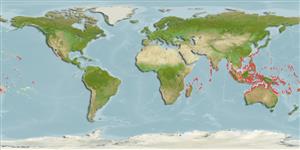Common names from other countries
>
Gobiiformes (Gobies) >
Gobiidae (Gobies) > Gobiinae
Etymology: Priolepis: Greek, prio = to saw + Greek,lepis = scale (Ref. 45335); inhaca: Named for its type locality, Inhaca Island, Mozambique (Ref. 10753).
More on author: Smith.
Environment: milieu / climate zone / depth range / distribution range
Ecología
marino asociado a arrecife; no migratorio; rango de profundidad 12 - 26 m (Ref. 1602). Tropical; 30°N - 27°S
Distribución
Países | Áreas FAO | Ecosistemas | Ocurrencias, apariciones | Point map | Introducciones | Faunafri
Indo-Pacific: East Africa to Taiwan and the Society Islands.
Tamaño / Peso / Age
Maturity: Lm ? range ? - ? cm
Max length : 4.0 cm TL macho / no sexado; (Ref. 2798)
Short description
Morfología | Morfometría
Espinas dorsales (total): 7; Radios blandos dorsales (total): 9-10; Espinas anales 1; Radios blandos anales: 8. This species has a few, relatively narrow (less than pupil diameter) light bars on the head (Ref. 37816); characterized by pinkish grey with dark brown scale edges forming a network; presence of three pale vertical lines below eye and interconnected pale lines on top of head; absence of pelvic frenum; longitudinal scale series 26-28; predorsal scales 12-17; ctenoid body scales; cycloid scales on pectoral fin base, breast and midlaterally on abdomen; opercle of adult with cycloid scales; predorsal scales absent; posterior edge of tubular posterior nostril adherent to edge of orbit; cheek with single vertical row of papillae; depth of body 4.0 in SL (Ref. 90102).
Has been collected from lagoons and drop-offs (Ref. 1602). Also found in reef crevices (Ref. 90102).
Life cycle and mating behavior
Madurez | Reproducción | Puesta | Huevos | Fecundidad | Larva
Hoese, D.F., 1986. Gobiidae. p. 774-807. In M.M. Smith and P.C. Heemstra (eds.) Smiths' sea fishes. Springer-Verlag, Berlin. (Ref. 2798)
IUCN Red List Status (Ref. 130435)
CITES (Ref. 128078)
Not Evaluated
Threat to humans
Harmless
Human uses
Más información
Age/SizeCrecimientoLength-weightLength-lengthLength-frequenciesMorfometríaMorfologíaLarvaDinámica larvariaReclutamientoAbundancia
ReferenciasAcuiculturaPerfil de acuiculturaRazasGenéticaElectrophoresesheritabilidadEnfermedadesProcesamientoMass conversion
Herramientas
Special reports
Download XML
Fuentes de Internet
Estimates based on models
Preferred temperature (Ref.
115969): 25.2 - 28.9, mean 27.7 (based on 214 cells).
Phylogenetic diversity index (Ref.
82804): PD
50 = 0.5000 [Uniqueness, from 0.5 = low to 2.0 = high].
Bayesian length-weight: a=0.01023 (0.00477 - 0.02194), b=3.02 (2.84 - 3.20), in cm Total Length, based on LWR estimates for this (Sub)family-body shape (Ref.
93245).
Nivel trófico (Ref.
69278): 3.1 ±0.3 se; based on size and trophs of closest relatives
Resiliencia (Ref.
120179): Alto, población duplicada en un tiempo mínimo inferior a 15 meses (Preliminary K or Fecundity.).
Fishing Vulnerability (Ref.
59153): Low vulnerability (10 of 100).
